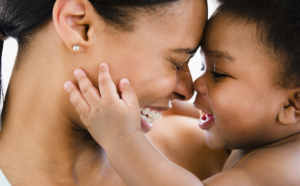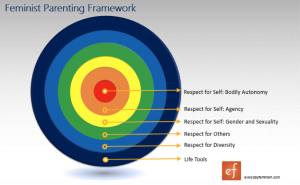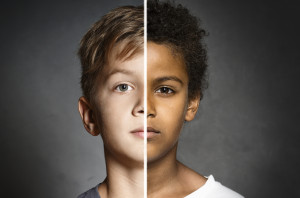
Source: Parent Dish
Much has been written in feminist circles about motherhood and feminism – the struggles women face as they become mothers, the battle for recognition and equality, and the systemic political marginalization of parenthood, for instance.
But outside of academic circles, much of feminism and mothering is presented as a “war” between mothers: Breastfeeding vs. Formula Feeding, Stay-at-home vs. Working Mom, attachment parenting vs. scheduled parenting.
What I find less information on is Feminist Parenting. Not feminist parenting as in “I’m a feminist and a parent,” but more in the actionable, skill-based philosophy of parenting through feminism.
When you think of Feminist Parenting, issues like gender diversity, body image, and sexualization might come to mind. Undoubtedly, these are huge issues in raising feminist kids.
But they are usually presented as an overlay to a parent’s general parenting philosophy. Like, choose a parenting style and then don’t forget to question gender norms and avoid media with poor body image messages, too.
What if Feminist Parenting was your parenting style?
What if every decision you make about raising your child was seen through the lens of feminism?
What if you didn’t use domination and power over your children but instead shared power with your children?
What if we had a road map to parenting that produced strong, socially conscious adults who are ready to change the patriarchy and kyriarchy from the inside out?
What Could Feminist Parenting Look Like?
The following is a fresh look at parenting rooted in feminist ideals of respect, equality, and social justice.
It’s not meant to be “the definitive guide” on feminist parenting, but rather, Everyday Feminism’s understanding of what feminist parenting could look like. Other feminists may have a very different opinion on this – which is totally fine, especially since we value and respect diversity.
This framework includes real strategies that you can apply in your home that will give you a more peaceful relationship with your child in the short term and a socially-responsible adult in the long term.
A Feminist Parenting Framework
This article is the overview and meant to give you a sense of each section. We’ll be exploring each section in greater detail with future articles.
Core Beliefs:
- Feminist Parenting is an actionable set of parenting skills that seek to raise children that exhibit values and behaviors that support equality and social justice.
- The problems that feminism seeks to address – violence, discrimination, lack of agency, and fear – can be best conquered by raising the next generation to believe deeply in respect for all people. When you have admiration for differences, you will be less likely to act violently toward another person, fear them, and thus discriminate against them, or create or sustain a system that robs a portion of the population of agency.
- Feminist Parenting acknowledges the fact that caregivers are the most significant influence on self-identity and world perspective in the early, formative years of childhood.
- Feminist Parenting asserts that teaching and modeling self-respect and respect for others set in all aspects of a child’s upbringing is the best foundation for compassion and respect.
Goals:
1. Respect for Self
The very foundation of feminism rests on the inherent value of each person. To value others, you first must first value yourself.
But respect for self is not genetic.
We aren’t born knowing we are valuable. We learn it from observation of those around us.
We quite literally learn where we end and others begin from our first interactions with our caregivers. From there, we learn the boundaries, powers, and value of our physical bodies and our thoughts.
1.1. Respect for Body or Bodily Autonomy
This is the basic understanding of your right to control your own body and to decide what happens to it. It’s one of the first lessons that we provide our kids.
How do we treat their bodies? Do we give them responsibility for their own body that is age appropriate?
Some ways this is tangible:
- Giving kids ultimate responsibility over their bodies, such as when they eat or sleep
- Telling them that they have a right not to be hurt and to say stop when they feel uncomfortable, regardless of who the person is
- Giving them real names for their body parts
- Trusting their abilities in age-appropriate ways
The goal is to teach children to respect their own bodies and stand up for themselves when they’re experiencing physical violations.
1.2. Respect for Feelings
This means validating that your thoughts and feelings are important and having strategies to understand and be with your emotions in a healthy way.
Unfortunately, you’d be surprised at how little we respect children’s voices, often answering for them or putting words in their mouths.
Here are some examples of teaching respect for feelings:
- Name emotions. Kids who can recognize and verbalize how they’re feeling are less likely to resort to expressing emotion through tantrums.
- Encourage all emotions as acceptable while still being responsible for their behavior.
- Model empathy towards themselves and others.
The goal is to model for children how to respect their own voice by our respecting them, too.
1.3. Respect for Choices, Gender, and Sexuality
These are separate topics because they are often very difficult subjects for parents. Taking one at a time can help.
However, in reality, respecting choices, gender, and sexuality are all just extensions of respecting the bodies and feelings of children.
- Let your kids control how they look within some limits, such as letting them cut their own hair like Jada Pinket Smith
- Expose your kids to a wide variety of gender expressions while honoring their preferences.
- Respect your child’s body, including their sexual body parts and sexual expression and not letting any fear of sex make you ignore, downplay, or forbid talk about sexuality.
The goal is to teach children to discover their own expression and to respect their own identity.
2. Respect for Others
With a firm foundation in respect for self, your child will have an awareness of their body, feelings, and how they affect others. This knowledge springboards nicely into the next stage which is translating that into respect for others.
By one year of age, most babies already show the ability to empathize, and even from birth, humans are hardwired to pay attention to facial expressions (and they quickly learn how to get their favorite reactions from you with those toothless smiles).
Empathizing with your children’s feelings as we saw above is the first step in the concept of emotional intelligence – the ability to recognize, assess, and control your emotions and those of others.
How does this look?
- Describe your feelings: You are already naming theirs, so name yours as well. “Ugh, Mommy is frustrated because the repair man isn’t here yet.”
- Apologize if you make a mistake: If you have a bad day and snap at your kids, saying “I’m sorry that I yelled; I was feeling very angry” gives your child the benefit of knowing that everyone makes mistakes and that all mistakes can be fixed.
- Practice perspective swapping: When an opportunity presents itself, ask your child how he thinks the other kid is feeling or how they would feel if in the same situation.
The goal is to teach children empathy for other people by modeling understanding and empathy for their feelings.
3. Respect for Diversity
Relating to people who are like us comes naturally. It can be more difficult to relate to someone that we don’t understand.
The interesting thing is that small children (under 3-5) don’t have this problem at all. To them, everyone is the same, and they usually don’t take notice of differences or treat those with differences in different ways.
Unfortunately, this is quickly replaced by intense grouping and stereotyping of people that is completely natural from 5-8 years old. Often, kids this age will vehemently reject ideas that are different so, for example, they will only play with “boy” toys or only play with other boys.
Since this is a natural stage of development, we don’t have to interfere with these thoughts and actions, but we do want to challenge and discuss them so they take that into the next stage of development.
What does this look like?
- Expose kids to as many types of people as possible.
- Expose kids to media that features diverse people (and limit media that perpetuates stereotypes).
- Spark conversation about differences when your kids notice them. For example, “Marcy’s in a wheelchair, but she likes basketball just like you. What else do you have in common?”
The goal is for children to see through the lens of my view and respect the personhood of those with other views.
4. Life Tools
This last category overarches all of the others, and I call it Life Tools. It includes how to take respect for self and others and become an agent for change in the world at large.
Whether they work for a Fortune 500 company or fix cars, these skills will help your children live according to their values and principles.
- Critical Thinking: A logical method for problem-solving including being an excellent brainstormer (which requires open-mindedness), identifying core issues, and interpreting data.
- Non-violent Communication: A method for mutually-respectful, democratic problem solving.
- Art of Happiness: Learnable habits that increase resiliency and contentment and identify happiness as a choice instead of a condition.
The goal is to give children the skills to live a meaningful, authentic life.
***
Whew! That was a lot.
But I’ll be going into detail on each section and helping you make these work in your everyday life.
Remember, you can use these strategies for any parenting issue, including:
- How can I “potty train” and teach respect for their body at the same time?
- How can I use relationship building and non-violent communication to give me a peaceful home free of sibling rivalry and bickering?
- How can respect for others help me get my kid to clean up his room?
- What if my child is bullied? What if my child is a bully?
All these questions and more will be explored within our Feminist Parenting Paradigm in future articles and online courses.
What parenting struggles are you having right now? How would Feminist Parenting help you?
[do_widget id=”text-101″]
Paige Stannard is a Parenting Writer and Educator for Everyday Feminism. She’s a former NASA research librarian happy to be home raising her 3 IVF babies after nearly a decade of infertility. She blogs about infertility, parenting, and women’s issues at Baby Dust Diaries as well as being the founder of the gentle discipline site ParentingGently.com and co-founder of the breastfeeding rights site NursingFreedom.org. She likes to cook and sew and has, in general, become her mother. Happily. Book her for speaking engagements and follow her on Twitter @babydust.
Search our 3000+ articles!
Read our articles about:
Our online racial justice training
Used by hundreds of universities, non-profits, and businesses.
Click to learn more





















